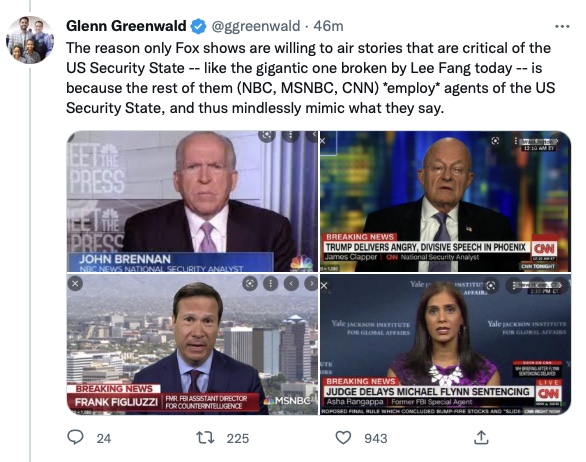Ken Klippenstein and Lee Fang of the Intercept have just broken one of the most important news stories of the decade. Caveat: You can’t read about it at the NYT, NPR, WaPo or NPR (I just checked) because it doesn’t fit their narrative. The U.S. Federal Government has been putting enormous pressure upon social media outlets to censor certain stories and push others without factual justification. This brazen censorship being done by social media outlets (and spinelessly followed by corporate media) has long been obvious to all of us who are heterodox thinkers, but we didn’t have access to the mechanism for this censorship and these lies . . . until now. Anyone who abhors tribal membership (I am one) constantly sees that social media and corporate media refuse to allow obvious questions and criticisms when publishing questionable claims (e.g., re COVID). What is the reason that so many of us are nodding in agreement at Noam Chomsky’s recent comment: ““The United States has imposed constraints on freedom of access to information which are astonishing and, which in fact, go beyond what was the case in post-Stalin Soviet Russia.” If you find Chomsky’s comment difficult to digest, read the article by Klippenstein and Fang. Here are a few excerpts from the much longer article, “TRUTH COPSLeaked Documents Outline DHS’s Plans to Police Disinformation“:
THE DEPARTMENT OF HOMELAND SECURITY is quietly broadening its efforts to curb speech it considers dangerous, an investigation by The Intercept has found. Years of internal DHS memos, emails, and documents — obtained via leaks and an ongoing lawsuit, as well as public documents — illustrate an expansive effort by the agency to influence tech platforms.
The work, much of which remains unknown to the American public, came into clearer view earlier this year when DHS announced a new “Disinformation Governance Board”: a panel designed to police misinformation (false information spread unintentionally), disinformation (false information spread intentionally), and malinformation (factual information shared, typically out of context, with harmful intent) that allegedly threatens U.S. interests. While the board was widely ridiculed, immediately scaled back, and then shut down within a few months, other initiatives are underway as DHS pivots to monitoring social media now that its original mandate — the war on terror — has been wound down.
Behind closed doors, and through pressure on private platforms, the U.S. government has used its power to try to shape online discourse. According to meeting minutes and other records appended to a lawsuit filed by Missouri Attorney General Eric Schmitt, a Republican who is also running for Senate, discussions have ranged from the scale and scope of government intervention in online discourse to the mechanics of streamlining takedown requests for false or intentionally misleading information. . . . .
There is also a formalized process for government officials to directly flag content on Facebook or Instagram and request that it be throttled or suppressed through a special Facebook portal that requires a government or law enforcement email to use. At the time of writing, the “content request system” at facebook.com/xtakedowns/login is still live. DHS and Meta, the parent company of Facebook, did not respond to a request for comment. The FBI declined to comment.
Emails between DHS officials, Twitter, and the Center for Internet Security outline the process for such takedown requests during the period leading up to November 2020. Meeting notes show that the tech platforms would be called upon to “process reports and provide timely responses, to include the removal of reported misinformation from the platform where possible.” In practice, this often meant state election officials sent examples of potential forms of disinformation to CISA, which would then forward them on to social media companies for a response.”


